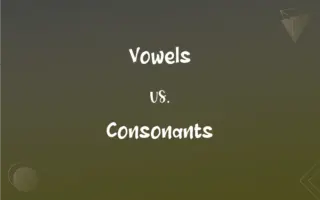Oral vs. Verbal: What's the Difference?
Edited by Janet White || By Aimie Carlson || Published on November 26, 2023
Oral communication involves spoken words, while verbal includes both spoken and written words.

Key Differences
Oral communication specifically refers to spoken words. It is often associated with face-to-face conversations and presentations. Verbal communication, on the other hand, encompasses both spoken and written forms of language, including emails, texts, and books.
In oral communication, tone, pitch, and volume play crucial roles in conveying messages. Verbal communication, in its broader scope, also includes the structure and choice of words in both spoken and written forms.
Oral communication is immediate and allows for instant feedback. Verbal communication, especially in written form, can be planned, edited, and refined.
Nonverbal cues like gestures are integral to oral communication. In contrast, verbal communication, particularly written, relies on punctuation and formatting to add nuance.
Oral traditions preserve history and culture through storytelling, while verbal skills are essential for literacy and formal education.
ADVERTISEMENT
Comparison Chart
Medium
Spoken words only
Spoken and written words
Feedback
Immediate in conversation
Can be delayed, especially in writing
Editing
No opportunity to edit
Written form can be edited
Nonverbal Elements
Relies on tone, facial expressions
Uses punctuation, formatting in writing
Tradition
Preserves culture through storytelling
Includes literature and written records
ADVERTISEMENT
Oral and Verbal Definitions
Oral
Pertaining to spoken words.
The oral instructions were clear and concise.
Verbal
Expressed in spoken words.
Her verbal agreement was later put into writing.
Oral
A tradition of passing down stories by word of mouth.
The tribe's oral history was rich with folklore.
Verbal
Relating to words, either spoken or written.
He excels in verbal reasoning tests.
Oral
An examination conducted by speaking.
His oral exam in history was quite challenging.
Verbal
Pertaining to verbs.
The sentence lacked a clear verbal action.
Oral
Relating to the mouth.
The dentist specialized in oral surgery.
Verbal
Conveyed through speech rather than action.
His verbal apology seemed sincere.
Oral
Verbal but not written.
She passed the test based on her oral presentation.
Verbal
Involving the use of words.
Their verbal dispute escalated quickly.
Oral
Spoken rather than written.
Verbal
Of, relating to, or associated with words
A detailed verbal description.
Oral
Of or relating to the mouth
Oral surgery.
Verbal
Concerned with words only rather than with content or ideas
A merely verbal distinction.
Verbal
Consisting of words alone without action
A verbal confrontation.
FAQs
Does verbal communication include body language?
No, verbal communication is strictly about words, spoken or written.
How do oral traditions differ from written histories?
Oral traditions are passed down by word of mouth, while written histories are documented.
Can verbal communication be non-spoken?
Yes, verbal communication includes both spoken and written forms.
Is an oral agreement legally binding?
It can be, but written contracts are often more enforceable.
Can verbal skills be improved?
Yes, through practice and learning, both spoken and written skills can be enhanced.
Do verbal warnings hold any significance?
Yes, they are often the first step in addressing an issue.
Is reading a part of verbal communication?
Yes, as it involves understanding written words.
What is oral communication?
Oral communication is the exchange of information through spoken words.
Are oral presentations important in education?
Yes, they help develop speaking skills and confidence.
Can oral communication be nonverbal?
No, oral communication is strictly spoken.
Does verbal communication require good vocabulary?
Yes, a good vocabulary enhances verbal communication.
Can oral traditions be recorded?
Yes, they can be recorded for preservation.
Are verbal agreements common in business?
They are common but less formal than written contracts.
Do oral histories change over time?
They can evolve as they are passed down generations.
Can someone be proficient in one form of verbal communication but not the other?
Yes, one might be good at speaking but struggle with writing, or vice versa.
Are oral exams more challenging than written exams?
It depends on the individual's strengths and preparation.
Is storytelling a form of oral communication?
Yes, it's a primary example of oral communication.
Are verbal skills important for leadership?
Yes, effective leaders often have strong verbal communication skills.
Is verbal abuse considered harmful?
Yes, it can be emotionally damaging.
Do oral cultures rely heavily on memory?
Yes, memory plays a key role in preserving oral traditions.
About Author
Written by
Aimie CarlsonAimie Carlson, holding a master's degree in English literature, is a fervent English language enthusiast. She lends her writing talents to Difference Wiki, a prominent website that specializes in comparisons, offering readers insightful analyses that both captivate and inform.
Edited by
Janet WhiteJanet White has been an esteemed writer and blogger for Difference Wiki. Holding a Master's degree in Science and Medical Journalism from the prestigious Boston University, she has consistently demonstrated her expertise and passion for her field. When she's not immersed in her work, Janet relishes her time exercising, delving into a good book, and cherishing moments with friends and family.






































































